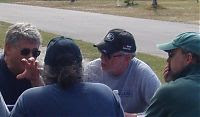Hi: I'm not posting this to necesarily to start a conversation -- I just thought you might find McKnight's discussion of the most influential books in his life interesting. After you watch this, we can return to the previous thread about influencing culture. McKnight is a voracious reader as well as prolific writer.
... By-the-way, McKnight started out teaching at a seminary, but decided to move to a liberal arts college in order to have greater influence on unchurched young people ... a good example of what we were talking about in the previous thread.
Saturday, September 26, 2009
Wednesday, September 23, 2009
One-by-one or Aim for the Top?
I heard a presentation a while back during which the presenter called into question our usual approach of seeking to extend the kingdom one person at a time. His point was that, by failing to significantly engage with the "culture-formers" of our world, we always end up being "behind the cultural curve"--the culture's effectiveness at "making disciples" outstrips the church's more one-by-one approach.
OK, OK, nobody's saying it has to be either/or, and nobody's arguing that most of us will generally enjoy ready access to culture-makers. But from a strategic point of view, have we put ourselves at a significant disadvantage by failing to engage our culture at its formative levels (e.g., schools and universities, the media, the arts, government [uh oh]... and what else do you see as primary culture-makers/culture-shapers)? Are you aware of good examples of Christ's people entering into this kind of engagement? Do you think the presenter I referenced was missing The Point (and, if so, what might The Point be)?
OK, OK, nobody's saying it has to be either/or, and nobody's arguing that most of us will generally enjoy ready access to culture-makers. But from a strategic point of view, have we put ourselves at a significant disadvantage by failing to engage our culture at its formative levels (e.g., schools and universities, the media, the arts, government [uh oh]... and what else do you see as primary culture-makers/culture-shapers)? Are you aware of good examples of Christ's people entering into this kind of engagement? Do you think the presenter I referenced was missing The Point (and, if so, what might The Point be)?
Thursday, September 10, 2009
What About Women?
No disrespect intended in the post title. How are you thinking about "gender roles," "women in leadership" and related issues? Are those who argue for equality/mutuality (e.g., evangelical "egalitarians") in roles simply aping, or conforming to, the culture? Does "in Christ there is neither... male nor female" nevertheless encompass role distinctions based, solely or primarily, on gender (more of the "complementarian" or "traditonalist" position)? Does any kind of "flexing" on gender roles--e.g., having women preach/teach (including preaching/teaching to men) represent a "slippery slope" that will ineluctably lead towards endorsing homosexual behavior or a denial of the uniqueness of Christ in salvation? Is this an area in which "the church" (however we understand it) is called to take an unpopular, counter-cultural stance (which would clearly be the case for those who argue for traditional gender roles)... or would we be shooting ourselves in the foot, from a missional perspective, by insisting on traditional gender role distinctions?
Monday, September 7, 2009
Labor day prayers
Lectionary Readings from the Anglican Book of Common Prayer
Ps 41, 52 * 44; 1 Kings 13:1-10; Philippians 1:1-11
Mark 15:40-47. ...waiting expectantly for the kingdom of God.
Commentary on Anglican lectionary readings
Daily Meditation from Henri Nouwen:
Living in the End-Time
We are living in the end-time! This does not mean that creation will soon come to its end, but it does mean that all the signs of the end of time that Jesus mentions are already with us: wars and revolutions, conflicts between nations and between kingdoms, earthquakes, plagues, famines, and persecutions (see Luke 21:9-12). Jesus describes the events of our world as announcements that this world is not our final dwelling place, but that the Son of Man will come to bring us our full freedom. "When these things begin to take place," Jesus says, "stand erect, hold your heads high, because your liberation is near at hand" (Luke 21:28). The terrible events surrounding us must be lived as ways to make us ready for our final liberation.
Ps 41, 52 * 44; 1 Kings 13:1-10; Philippians 1:1-11
Mark 15:40-47. ...waiting expectantly for the kingdom of God.
Commentary on Anglican lectionary readings
Daily Meditation from Henri Nouwen:
Living in the End-Time
We are living in the end-time! This does not mean that creation will soon come to its end, but it does mean that all the signs of the end of time that Jesus mentions are already with us: wars and revolutions, conflicts between nations and between kingdoms, earthquakes, plagues, famines, and persecutions (see Luke 21:9-12). Jesus describes the events of our world as announcements that this world is not our final dwelling place, but that the Son of Man will come to bring us our full freedom. "When these things begin to take place," Jesus says, "stand erect, hold your heads high, because your liberation is near at hand" (Luke 21:28). The terrible events surrounding us must be lived as ways to make us ready for our final liberation.
Subscribe to:
Posts (Atom)

